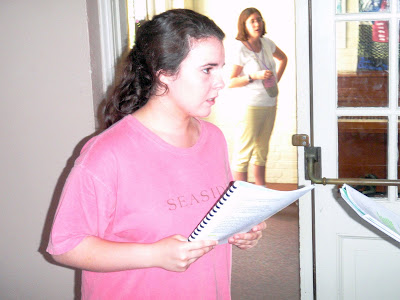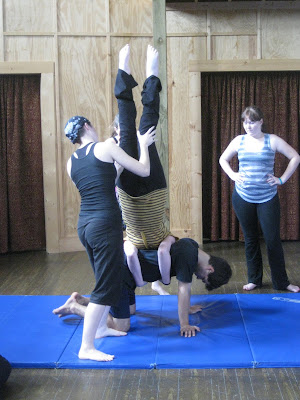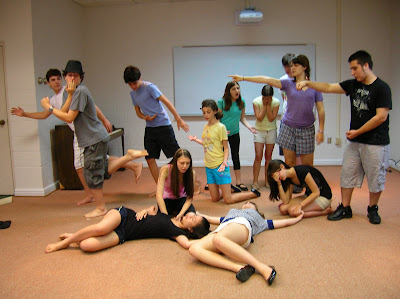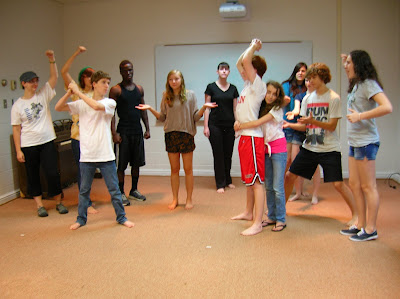
The Greeks did their theater with the lights on too. But their stages and their audiences were much larger. To illustrate this, our lecturer from this Tuesday, Amy Cohen (Professor of Classics at Randolph College, and daughter of the ASC’s co-founder and Director of Mission, Ralph Cohen) brought every camper into a circle on the King Theater stage, to feel how close everyone is together, then took everyone outside and had us form a circle in the grass outside, a circle at least four times as large. “This is the scale. Size matters in theater.”
One of the ways size matters so much in Amy Cohen’s productions is in the use of masks for their productions. She and her students have been using full helmet masks in their productions of Greek plays at the college amphitheater, which suit the larger space far better than a tighter indoor venue. To give the campers an experience with these masks, she gave them a little bit of choreography for “row, row, row your boat” and had a group of volunteers all sing and dance together.
 
The masks are a bit creepy when you first see them, but they improve with exposure, and they seem less weird when the wearers are portraying some sort of strong emotion or action. Cohen has mentioned that it usually takes an audience about five minutes to accept the masks in performance, but that that time is doubled when they have in-climate weather and have to perform indoors. The masks need more space to function. Once an audience has accepted the masks, the masks morph into the character portrayed -- so much so that she often gets questions about how they make the masks move, or how many masks they have for different emotions, when they don’t move at all, and the only emotions read onto them are the ones given by the actor through their bodies.
She had some of the campers do a couple of scenes with the masks on, to show a little of how the masks work in performance. Here is Rachel playing Bottom in A Midsummer Night’s Dream.

After her demonstration with the masks, Cohen fielded all sorts of questions about Greek theater, about the plays in this camp and their classical roots, and about Greek history. She dispelled some common misconceptions about “Classical Theater” such as a “tragic flaw” or the “Aristotelian unities” which get passed off as rules, when examination of the plays we know from the time show these “rules” are merely observations of what happens some of the time. She talked about Greek heroism, and how it is much more self-serving than Roman ideals. Greek heroes seemed to long for their names to be remembered far more than they were concerned about loyalty to a person or state. She also pointed out that the subjects of the Greek plays, particularly the tragedies, are big and noble and not at all colloquial. Today many translations attempt to make them feel like they are the sort of drama which might happen in the living room, but they are comprised of stories with massive scope and consequence. She also mentioned that love stories were not popular topics for drama (until later in Greek history, maybe 4th century BC) the way they are now. Shakespeare and Marlow take some of the scope and grandeur of these stories and add love stories to them, add normal everyday people who bring these stories home, into our lives and minds.



























 The American Shakespeare Center Theatre Camp offers two summer Shakespeare intensives for ages 13-18 (residential or day camp). In each three-week session campers perform in an hour-long version of a Shakespeare play; participate in performance master classes (stage combat, dance, music, acrobatics); attend academic classes (theatre history, scansion/rhetoric, source study); and visit the Blackfriars Playhouse to watch the professional Resident and Touring Troupe actors rehearse and perform in our summer season of plays.
The American Shakespeare Center Theatre Camp offers two summer Shakespeare intensives for ages 13-18 (residential or day camp). In each three-week session campers perform in an hour-long version of a Shakespeare play; participate in performance master classes (stage combat, dance, music, acrobatics); attend academic classes (theatre history, scansion/rhetoric, source study); and visit the Blackfriars Playhouse to watch the professional Resident and Touring Troupe actors rehearse and perform in our summer season of plays.